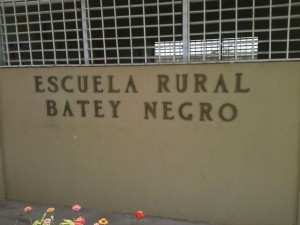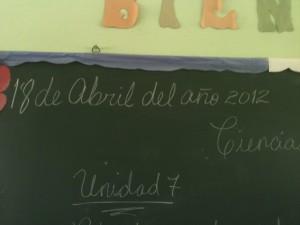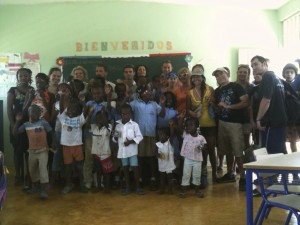
Last week I went to the Dominican Republic for a much needed vacation. Contrary to popular belief, non-profit workers take time-off. Well, at least we try, I think. Truthfully, I believe everyone should take a vacation. Even if it’s only for a few days. It helps one decompress, re-charge and avoid burn-out. But, somehow on my vacation I was unable to turn off the lens of philanthropy and charity that I tend to look at the world through. Instead, I managed to find myself in the middle an uncomfortable, possibly unethical and disconcerting situation on vacation.
My friend and I signed up for an morning excursion to drive dune buggies through the Dominican countryside in Cumayasa. It seemed like a fun way to see a part of the country that we wouldn’t be able to access on our own. We were told that we would be driving on dusty roads, passing by banana fields, visiting a cave, swimming at the beach, visiting a school in a Haitian village (referred to as Batey Negro), and finally exploring an old quarry. It gave me pause that the tour operator said we would be visiting a school, but I thought it was simple a mistransaltion. Now, I’m no stranger to poverty, but being told I would get to drive through a poor village seemed unusual to say the least. However, all confusion was lost when the tour operator suggested we purchase snacks to hand out to the the children at the school. Apparently, it’s a common practice by visitors.
The day of the excursion arrived and we packed our bag with sunscreen, cameras and snacks for the children at the school. Once arriving at the location, I quickly forgot that we would be stopping in a village and focused on driving my dune buggy. After about an hour and half drive we finally made it the the village. More isolated than I expected, I realized that many of the homes were made of wood. In a tropical region, a home made of wood slats is not that weather resistant. Nonetheless, it is still a place to call home, I presume. In contrast, the one-room school was made of concrete and well-maintained. As we approached the school, children greeted us in the yard and it became evident that they are accustomed to foreigners visiting them. Moreover, some of the other people in my group seemed thrilled to be able to take photographs with the children. I didn’t feel comfortable doing so, so I took photos of their chalkboard and posters on the wall.
In all honesty, it reminded of a “Feed the Children” commercial but I couldn’t turn it off. A sinking feeling started to develop inside me. It just didn’t feel right to be there. Standing inside the large room, a list of questions began to surface in my mind. Simply put, I never thought I would become a poverty or slumdog tourist but at that moment I was standing in one-room school posing for a group picture and wondering why I felt terrible.
Isn’t it rude to visit an elementary school to parade strangers through this classroom? Is this an effort to show how poor this community is or is it an attempt to let foreigners gain a better understanding of the region? Would something like this ever happen in America? Why are the children fighting over the pens and snacks we brought for them? Am I only one that thinks this is perfect example of poverty tourism? Or am overreacting?
Save for my friend, the rest of the group appeared unfazed by the stop at the village. Others appeared to enjoy the visit. I did not.
In attempt to understand this a bit more I did some research and learned that this subject has been heavily debated in the non-profit/development blogger sphere. For example, Good Intents has a compilation post about the debate. But, I found Kennedy Odede’s NYT Op-Ed to reflect my experience the most. “Slum tourism turns poverty into entertainment, something that can be momentarily experienced and then escaped from.” And honestly, that is what it felt like. I wasn’t spurred to action to help get better living conditions to the village. Instead, I left with a heavy conscience and a sense of helplessness. I simply felt that this specific part of the tour was probably doing more harm than good.
“Aside from the occasional comment, there is no dialogue established, no conversation begun. Slum tourism is a one-way street: They get photos; we lose a piece of our dignity. Slums will not go away because a few dozen Americans or Europeans spent a morning walking around them. There are solutions to our problems — but they won’t come about through tours.”
As Obede’s conclusion explains, there was no dialogue between us and the village residents, the schoolteacher or the children. Perhaps, I’m idealistic but I think the least we could have done as a group was introduce ourselves.
Readers, what do you think about visiting distressed areas in developing countries? How could this visit have been conducted better? Do you believe I am being too critical? Or am I missing the greater meaning of our visit to the Haitian village?



My nephew and I are leaving for Punta Cana the end of July, and we have decided that we are taking a case of soccer balls and Candy to pass out to the children that we come across in the poor parts of town. I know it’s something small but a lot of times you see these kids sitting around doing nothing and who knows passing out a soccer ball just might be their way out. It might sound kind of corny but I’m doing it so that my nephew who graduated high school at 17th and is heading off to college to become a doctor will have an idea of what a real third world country looks like it’s not the resort we’re staying on at the beach. I want him to see and experience it all so that he could appreciate what he has had and what he will have and that he will remember to always give back to others and to donate to Charities and have a giving heart. He knows he’s lucky, cherished & blessed. I want him to know what it feels like to put a smile on a less fortunate child while spreading the love of Jesus.
Dee